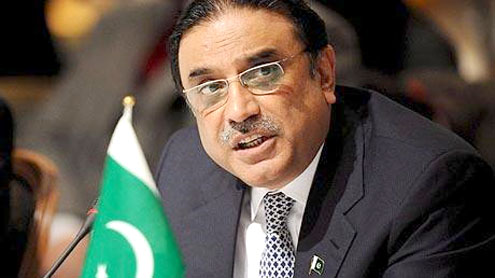 ISLAMABAD – Perturbed by the Supreme Court (SC) orders pertaining to the National Reconciliation Ordinance (NRO) and the memo controversy, President Asif Ali Zardari has decided to explore political avenues to plead his ‘case’ on both of the contentious issues before the elected representatives of the people when he will address the joint session of parliament after Muharram ends.
ISLAMABAD – Perturbed by the Supreme Court (SC) orders pertaining to the National Reconciliation Ordinance (NRO) and the memo controversy, President Asif Ali Zardari has decided to explore political avenues to plead his ‘case’ on both of the contentious issues before the elected representatives of the people when he will address the joint session of parliament after Muharram ends.
Another issue that does not affect him as an individual but becomes his official responsibility as head of state and commander-in-chief of the armed forces is that he is also expected to speak in detail on the NATO-ISAF attack in Mohmand Agency, which changed the diplomatic scenario after Pakistan’s refusal to participate in the Bonn Conference, despite international pressure, as a protest against violation of its sovereignty. “President Asif Ali Zardari, who is also supreme commander of the armed forces, has decided to address a joint session of parliament after Muharram,” Presidential Spokesman Farhatullah Babar said in a press release. The contents of the release are also reflective of the worry and concern of the president on the issues of the NRO and the memo. “The president also called upon the party workers to show patience, strictly observe democratic norms and refuse to be provoked into any aggression.” The spokesman quoted the president as saying: “Aggression is the mindset of the weak and not the strong.” Though the press release did not mention against what or whom the president felt his party workers could be provoked, he called upon them to show patience. The Supreme Court orders are, however, what he probably considered as an aggression against him, which could provoke his party workers.
The press release further quoted the president as saying: “Democracy calls for tolerance, patience and steadfastness as demonstrated by Aung San Suu Ki in standing up to mountains of hardship for the cause”. It clearly appears that frustrated by the apex court’s orders, particularly on the two issues, the president has decided to take parliament into confidence, particularly on the obligations attached to the decision on the NRO review petition. Writing a letter to the Swiss authorities to reopen cases against him, memogate and the NATO attack, which has put relations between Pakistan and the US at the lowest ebb since the start of the war against terrorism, are clearly weighing on his mind. When asked why the president felt the need to address a joint session of parliament, PPP South Punjab President and Textile Industries Minister Makhdoom Shahab-ud-Din said: “Basically, the president would take parliament into confidence over the NATO attack… the issues of NRO and memogate might also crop up during the address.” He said the president may discuss the allegations leveled by a ‘dubious’ character, Mansoor Ijaz. When PML-N Information Secretary Senator Mushahidullah Khan was asked about his party’s strategy for the joint session, he said it was too early to say anything on it. JI’s Professor Khurshid said his party had yet to decide a strategy. Under Article 56(1) of the constitution, the president may address either House or both Houses assembled together and may for that purpose require the attendance of the members. Usually, the president addresses both Houses assembled together at the commencement of the first session after each general election to the National Assembly and at the commencement of the first session of each year. – pakistantoday












